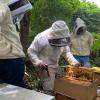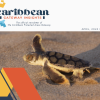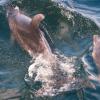Reducing the input of plastic litter into the ocean around Grenada (2015)
Grenada, a tri-island nation state with a total area of 344 km² and total coastline of 121 km, has around 107,559 inhabitants. Some 300,000 tourists visit the islands every year, mainly to explore and enjoy the islands’ wealth of nature: their landscapes, coasts and seas. Two thirds of the islands’ tourists only visit during the day, while the remaining third comprise stay-over tourists.
The waste produced on the islands is currently collected by a well-organised collection service that boasts a collection coverage rate above 98%. Many economic instruments have already been introduced to cover the high costs of waste collection, such as waste management fees for households rated according to electricity use, environmental fees for goods importers, tourist fees, and fines. However, a number of issues remain to be tackled and the cost of the waste management system is still greater than the income that it and its instruments collectively generate. There is still no integrated approach to waste management: the separate collection of different waste fractions has yet to be adopted and collected waste is primarily disposed of in Perseverance landfill, an open landfill site located close to the sea.
In addition, a large amount of waste still ends up as litter in the environment due to culturally ingrained habits, inappropriate waste-disposal behaviour, public lack of awareness, and tourism activities. It is estimated that around 15% of municipal waste is littered. The percentage of plastic bottle waste that is littered amounts to up to 30%.
Given the islands’ geological and hydrological conditions, local stakeholders expect that most of the plastic bottle litter as well as some of the plastic bottle landfill waste will sooner or later end up in the sea, negatively impacting the islands’ marine ecosystem.
Area of interest: Grenada
Year: 2015




